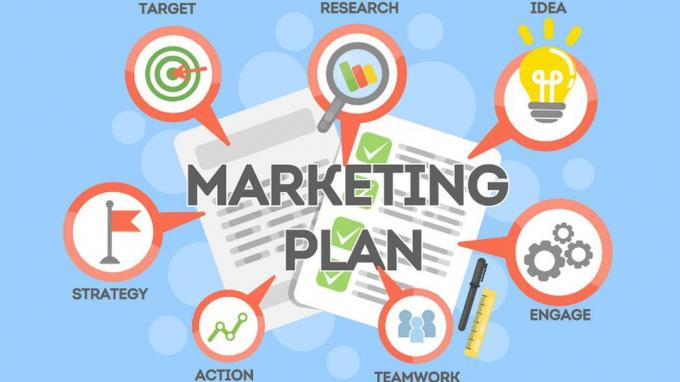Marketing Management: Material, Definition, Functions, Objectives, Examples
If you are learning about business, then surely one of your learning materials is marketing management.
Marketing Management is a series of processes from analysis, planning, implementation, and monitoring as well as control of a marketing activity.
Which has the goal to achieve the target of the company effectively and efficiently.
As for other sources who say that this marketing management is a tool used in analyzing, planning, implementing and also controlling in a program in the company.
It has been designed to create, build and maintain exchanges in order to be profitable.
These profits will later be used as a way to achieve the main goals of a business or company.
The management actor in the marketing field is a marketing manager who will study various financing structures, sources of profit, resources and competencies.
In general, the definition of marketing management is:
The process of analyzing, planning, implementing and monitoring a program with the aim of creating a program exchanges with markets that are aimed at and lead to the achievement of company goals effectively at the same time efficient.
Other things that are also studied by marketing managers are product differentiation and competitive position, level of vertical integration, historical response to industrial developments and other factors that are still related to competitors.
For more information about Marketing Management, see the following review.
Table of contents
Understanding Marketing Management Manajemen

In addition to the general understanding above, there are opinions from several experts regarding the definition of Marketing Management, including the following:
1. Philip Kotler (1980)
Marketing management is a process of analysis, planning, implementation, and monitoring of various programs which has the aim of generating exchanges with the target market with a view to achieving the objectives company.
2. Dharmamesta and Handoko (1982)
Marketing management is one of the main activities carried out by companies to maintain the existence of the company, develop and benefit from the activities exchange. Long before the goods were produced, the marketing process had been carried out and did not end with sales. In addition to sales, marketing activities must also provide satisfaction to consumers. This is what all companies must do so that their business can continue and consumers have a good view of the company.
3. William J. Stanton
Marketing management is a system of all business activities aimed at for planning, pricing, promotion, and distribution of satisfactory goods or services consumer.
4. Sofjan Assauri (2013:12)
Marketing management is an activity analysis, planning, implementing, and controlling various programs. Which has been structured into the formation, development, and maintenance of profits resulting from transactions or exchanges through target markets in order to achieve the company's goals in the long term.
5. Basu Swastha (2008:5)
Marketing management is an overall system of various business activities aimed at planning, pricing, promote, and distribute goods or services that can satisfy the needs of both existing buyers and buyers potential.
6. Buchori and Djaslim (2010:5)
Marketing management is a process of planning and implementing the conception, pricing, promotion and distribution of ideas, goods and services, in order to produce exchanges that satisfy individuals and fulfill goals organization.
7. Ben M. Eniy (2007:130)
Marketing management is a process to improve the efficiency and effectiveness of marketing activities carried out by a person or company.
8. American Marketing Association
Marketing is a process of planning and implementing the concept, promotion, pricing and distribution some ideas, goods or services to produce exchanges that can satisfy individual goals and organization.
Marketing Concept

From the various definitions of marketing above, it is also obtained from the marketing concept.
What is a marketing concept?
The marketing concept is a marketing planning activity in order to achieve the company's goals, namely customer satisfaction which consists of several elements such as those below:
- Product
- Price
- Placement
- Promotion (Social and Global)
The following is a further explanation of each marketing concept:
1. Production Concept
The first concept is used by companies that believe that consumers want products at affordable prices and easy to obtain.
Thus, the production goods will be easily marketed. Companies that apply this concept will produce in large quantities to reduce production costs.
That way, they can reduce capital by implementing mass production. This concept can also be successfully applied if there is a higher market demand than the product being offered.
2. Product Concept
The product concept is seen by the assumption that consumers tend to prefer quality products, where price and product availability do not have much influence on purchasing decisions.
Companies that apply this concept will generally produce goods of the highest quality. And of course it will be priced at a higher price.
These relatively more expensive products will not attract some buyers who are still thinking of choosing products with lower prices.
3. Sales Concept
Unlike the two marketing management concepts above, which focus on products. This sales concept will focus on product marketing.
This concept believes if any product; regardless of quality, price, or market demand; product will be marketable if the company sells it aggressively.
This sales concept is not concerned with the relationship between consumers, and tends to only prioritize sales targets with profit.
Therefore, companies will tend to ignore customer satisfaction and customer loyalty.
4. Marketing Concept
Companies that apply the fourth marketing management concept will make consumers the center of attention.
The company will focus on consumer needs and try to understand what is desired in the market.
Not infrequently, the company will do research first before starting production and marketing the product.
Companies that apply this marketing concept can have more value than their competitors.
And also will make consumers will be more loyal to one brand compared to other brands brand other.
5. Social Marketing Concept
The last marketing management concept is newer than the previous four concepts.
Not only emphasizing the focus on consumers, the concept of social marketing will also emphasize the interests of consumers and society in general.
Companies that apply this concept will also consider ethics in terms of their marketing practices.
Not only focusing on profits, the company will also try to balance the needs, satisfaction, and interests of consumers.
From the five concepts above, it can be seen that if there are 3 important elements in the concept of marketing management, including:
1. Consumer Orientation
Where will make consumers as kings, producers will later provide the best offers. Whether it's ranging from the best products to the way customer service.
2. Marketing Activity Planning
All marketing activities, starting from strategy, implementation, analysis, monitoring, and other activities related to marketing must be prepared in detail.
3. Consumer Satisfaction
Consumer satisfaction is not only measured by product quality, but also by how the company's marketing strategy is carried out.
After understanding some of the definitions above, we can conclude if the marketing management formulation states that:
Marketing management is a management process that includes analyzing, planning, implementing and monitoring marketing activities carried out by a company.
Important Terms in a Marketing Context

Here are some terms that are often used in the context of marketing, including:
1. Products (Goods, Services, Ideas)
Are all the results of human work that can be offered to other humans, whether in the form of goods, services or ideas.
Consumers will like the product by offering the best quality, best performance and best properties.
So that it will make the company must focus itself on continuous product improvement.
Like products that are easily available and at affordable prices, management must focus on improving production and distribution efficiency.
2. Score
Consumers' estimates of a product for their satisfaction, what they feel or want, differences between the value that customers enjoy from owning and using a product and the costs of owning the product that.
3. Cost
The price that consumers have to pay for the products they consume.
4. Satisfaction
How satisfied consumers are with the products they consume (the match between expectations and reality).
Satisfaction (customer satisfaction): the degree to which the perceived performance (perceived performance) the product will meet the expectations of a buyer or not.
5. Market
A place that contains all potential customers who intend to transact on a product.
Marketing Strategy Planning

Marketing strategy (Marketing Strategy) is a process to determine the target market with the associated marketing mix strategy in which:
1. Target Market
It is a homogeneous set of customers or markets for which a firm wishes to serve.
2. Marketing Mix (Marketing Mix)
These are various variables arranged by the company in order to satisfy the target market.
This Marketing Mix is a combination of four variables or activities that are the core of the company's marketing system.
Among them are: product, price structure, promotional activities and distribution channel system.
The various marketing mix variables above can be used as a basis for taking a strategy in an effort to gain a very strategic position in the market.
Marketing Management Development Stage

As additional information for all of you, marketing management has also undergone various developments. Why is that so?
Because of the industrial revolution. Some of the stages are as follows:
- Production Orientation Stage
- Sales Orientation Stage
- Marketing Orientation Stage
- Stage of Social Or Community Orientation
Marketing Management Function

The following are some of the important functions of marketing management, including:
1. Product delivery function (distribution)
The function of marketing management is very important with the aim that our products are known by the wider community. So, people will be interested to buy it.
In the absence of this first function, how do people know about our products?
So, what's the point if we can make a product but people don't know the location of our product.
For example:
Gilang will start a business to sell goods deposit services. At the beginning he founded his service business, only Gilang knew.
Therefore, he needs to promote or deliver his products to the public. So, in the end, Gilang carried out promotions to various social media so that the public knew about Gilang's custodial service business.
2. Buy-sell function (trades)
The second management function is the basic essence of marketing management in order to be able to provide benefits from the buying and selling process of the products it has.
The buying and selling is the activity of the existence of product transactions, whether in the form of goods or services carried out by producers and consumers.
If this principle can really be applied by marketing management, then this will provide benefits for both companies and consumers.
As an example:
A company is able to do marketing management well. Thus, the products they offer are in great demand and purchased by the public.
From here, the function of buying and selling can provide benefits for the company as well as consumers.
The company will later benefit because the amount of revenue from the sale of its products is greater than the cost of production.
Meanwhile, consumers will benefit because they can meet their needs.
3. The function of providing facilities (facilitation)
The third function is a function related to various aspects to achieve smooth production.
These aspects include aspects of warehousing, communication, and also sorting products to conform to standards
For example:
A large company will distribute its products to various regions throughout the place.
However, the company is not possible if the goods from the production process continue to be delivered to the regions and directly sold there.
Surely the company will have to store its products first in a warehouse (warehousing) before it is ready to be marketed.
4. Function to do research (Research)
Marketing management must also conduct research on consumers about what goods are needed by consumers.
So, in the marketing process, it will be accepted and sold in the market
As an example:
Gilang is a marketing manager in a shoe company.
Gilang is doing research on how to make the shoes sell well in the market. Then, Gilang made various collaborations with artists to organize “love local produce”.
From this collaboration, these shoes are in great demand and also purchased by the wider community.
5. processing function (Processing)
The processing function is a process of converting an item to become an item that has added value. So that later it will increase the selling value of the item.
As an example:
The price of a grape is Rp. 5000 and then the wine will be converted into grape jam so that it will increase the value of the product.
And will increase the selling price of the goods to Rp. 12,000.
Marketing Management Goals

Why the hell Marketing management is needed?
Yes of course because it has a purpose and purpose. Thus, the marketing management has several general objectives as below:
1. Add request
The first objective of marketing management is to increase demand.
Just imagine if we sell a product, but the product we also have no demand at all
Therefore marketing management will think about packaging (packaging) attractive to their product.
It aims to make the public or consumers interested and willing to buy products from them.
2. Creating Consumer Satisfaction
The purpose of the next marketing management is to create customer satisfaction. Consumer satisfaction is created because there are consumers who get several satisfactions such as:
- Consumer Surplus
Consumer surplus is obtained by exchanging the money they give into the goods they want.
As an example:
A consumer wants to buy a smartphone and he gets cashback from buying the smartphone. This cashback is known as consumer surplus.
- Utility or Satisfaction
From purchasing the product, consumers will get several utilities as below:
-
Time utility
It is an increase in customer satisfaction because consumers get the product at the right time. -
Place utility
Is the value of customer satisfaction that will increase if consumers can get what they want with a closer distance. -
Owner utility
It is the added value of customer satisfaction because consumers can own or buy an item,
3. Gaining Market Share
You need to know that market share is the total number of requests from consumers for goods and services that can reflect the class of consumers based on their distinctive character.
So that marketing managers can obtain data on consumer behavior.
Market share is also very useful if a company gets competitors or competitors from other companies that have similar products to them.
So, this is where marketing management will really need to compete with the strategies they have so that their products or services are in demand in the market.
4. In order to get profit
The main purpose of a marketing management is to obtain maximum profit or profit with certain expenses.
Earnings from a company can also be used to measure success in a company.
This advantage can be obtained by marketing management who is able to work well so that the company's product marketing can make its products sell well in the market.
5. Creating Branding or Image
The purpose of this marketing management is to be able to create a positive branding or image in the eyes of the public for its products.
Therefore, people will be willing and able to buy their products with pleasure.
As an example:
We compare KFC with fried chicken sellers on the street.
Basically, they both sell the same product. However, consumers are willing and able to buy chicken at KFC which incidentally has a much more expensive price than fried chicken on the street.
This is because KFC has a big and positive branding or image in the community.
6. Maintaining Business Continuity
Survival in the company is the responsibility of managers, including marketing managers.
This can not be separated because marketing has an important role in maintaining the survival of the company.
If the product is sold in the market, it will make the company profit.
For example:,
Gilang has a meatball business and has good marketing management. So this makes the meatballs sell well and Gilang can get a big profit.
Some of the profit Gilang then uses to buy the materials used to make his meatballs again so that his business of selling meatballs can continue.
Objectives of Marketing Management in terms of Time Period

The objectives of marketing management can also be seen in terms of the time period, including:
1. Short-term
The short-term goal for the company is profit as quickly as possible.
Which means that it can cover all production costs that have been used, and if an excess is found, it can be called a profit or profit.
2. Medium-term
The medium-term goal is to try to break even between the total cost of production and the total sales volume, expanding the scope of promotions, and trying to further enlarge the volume coverage sales.
3. Long-term
For the long term the company is to maintain loyal customers in order to remain loyal to its products.
Among other things, by implementing innovative, creative and more efficient products, and also providing special discounts for customers.
Thus a brief review this time that we can convey. Hopefully the above reviews can be used as your study material.
